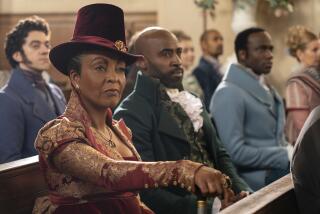Review: Jane Austen meets hookup culture in Netflix’s exquisitely silly ‘Bridgerton’
- Share via
It’s taken a little more than three years, but Shonda Rhimes’ first Netflix series since signing an exclusive, reportedly nine-figure deal with the streamer is here. With “Bridgerton,” premiering on Christmas Day, the celebrated creator of “Grey’s Anatomy,” “Private Practice” and “Scandal” adds to her list of executive producer credits — including “How to Get Away With Murder,” which concluded earlier this year — by reaching back to 19th century England for inspiration, romance, mystery and, yes, plenty of drama.
The charming and addictive series, based on the romance novels of Julia Quinn, is set in the competitive marriage market of Regency London’s high society, a.k.a. “the ton” — a nickname drawn from the French for “good manners.” ‘Tis the season for wizened matriarchs to present their eligible offspring at an exhausting number of balls, luncheons and parties in a sumptuous pageant of exquisite gowns, sparkly tiaras and silken waistcoats.
But underneath all that finery is the raw desire, lust and treachery you’d expect from a production helmed by creator-showrunner Chris Van Dusen, Rhimes’ protégé and former producer on both “Scandal” and “Grey’s.”
The uptight decorum and prudish manners of the era are re-imagined through a modern lens, à la Oscar winner “The Favourite” or acclaimed TV series like “The Great” and “Dickinson,” and “Bridgerton’s” mix of values and eras is a joy to watch. The series naturally moves from stolen kisses in the garden one moment to torrid sex romps in the parlor the next. Bashful glances at the ball live in the same world with orgies at a clandestine gentlemen’s club. Historians and Jane Austen purists may take offense, but this well crafted, escapist drama — where orchestras play covers of Ariana Grande and Billie Eilish hits — is not meant for them.
“Dickinson” from Apple TV+ is a pointed love letter to an American icon, rebel spirit fully intact.
Also up for reinterpretation are race relations in snobby old England. Black and white leads abound, as do interracial relationships. The rest of society is a blend of every skin tone and ethnicity: neoclassical ringlets and jewel-adorned chignons mingle with powdered Afros and flowing dreadlocks. Though there’s a brief nod at an explanation — the king’s marriage to Queen Charlotte (Golda Rosheuvel), a Black woman — the series implies but does not linger on its fictional society’s racist past, much less question its swift resolution. Class, not color, is the basis for “Bridgerton’s” pride and prejudice.
At the forefront of the charge: a powerful gossip columnist known only as Lady Whistledown. Voiced by Julie Andrews, she narrates the series, though her identity remains a mystery until the season’s closing moments. The future of the ton’s ladies and gentlemen is balanced on the tip of her pointed/poisoned pen.
Central to her game of human chess are the lovely Daphne Bridgerton (Phoebe Dynevor) and dashing Duke Simon Basset (Regé-Jean Page). Daphne is sheltered and naive to the ways of the world, but she is clever when it comes to navigating the perils of high society. Her mission: to increase her worth and nab a suitor.
Simon is a cocky, experienced rogue. He has a problematic family history and cares little for aristocratic events and the gossip they generate — but he also has a goal of evading marriage that Daphne’s collusion can help him achieve. The unlikely duo devise a plan to fool the ton, their meddling families, Lady Whistledown and the gossip-obsessed queen and achieve their respective ends by pretending to be in love. (One guess what happens next.)
“Bridgerton” may delight most of all in upending the historical realities of women’s repression with a detailed narrative of Daphne’s sexual awakening. Much of its lively, fast-paced story is filtered through her gaze, with longing, conquest, passion, sex, love and loss all hers to explore, enjoy and agonize over. It’s a welcome flip of the script from TV’s traditional period romances.
Other key players in the series’ eight episodes include Daphne’s rebellious younger sister, the captivating Eloise (Claudia Jessie) — an early feminist who vows never to take a vow — and her friend and neighbor Penelope Featherington (played empathetically by “Derry Girls’” Nicola Coughlan) — a quiet girl whose unrequited love for one of Daphne’s brothers is among the series’ many wonderfully dramatic and consuming subplots.
Top hats off to “Bridgerton,” an unexpected gift in a year full of coal.
‘Bridgerton’
Where: Netflix
When: Any time, starting Friday
More to Read
The complete guide to home viewing
Get Screen Gab for everything about the TV shows and streaming movies everyone’s talking about.
You may occasionally receive promotional content from the Los Angeles Times.







